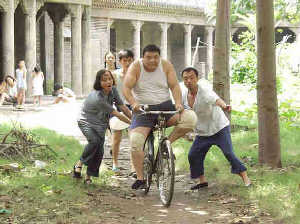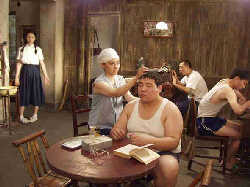 Movie Review of Peacock: The Memory of A Generation
Movie Review of Peacock: The Memory of A Generation
 The film Peacock is set in the small town of Heyang, home of the Gao family. The Gaos are not wealthy, but there is no lack of love and warmth among them. The parents are hardworking, honest people. Weihong, the daughter, loves art and dreams a lot, but often feels depressed about her failure to join the military. Both her career and her marriage are unsuccessful. The elder son, Weiguo, has a slight mental disorder and is his parents' pet, but is often bullied by people outside the family. He also suffers setbacks in finding his ideal mate and has to settle on a less-than-perfect marriage. The younger son, Weiqiang, a sensitive, gloomy lad, is silent but self-adoring. He drops out of middle school and marries a divorced actress.
The film Peacock is set in the small town of Heyang, home of the Gao family. The Gaos are not wealthy, but there is no lack of love and warmth among them. The parents are hardworking, honest people. Weihong, the daughter, loves art and dreams a lot, but often feels depressed about her failure to join the military. Both her career and her marriage are unsuccessful. The elder son, Weiguo, has a slight mental disorder and is his parents' pet, but is often bullied by people outside the family. He also suffers setbacks in finding his ideal mate and has to settle on a less-than-perfect marriage. The younger son, Weiqiang, a sensitive, gloomy lad, is silent but self-adoring. He drops out of middle school and marries a divorced actress.
Heyang, though a fictional place, is based on the real-life city ofAnyangin Central China'sHenan Province. In the movie, the actors and actresses speak Anyang dialect, which is a very noteworthy feature because a dialect usually reflects the collective wisdom and life experience of local people and illustrates their ways of thinking. One reason that Weihong falls in love with the officer (which led her to want to join the military in the first place) is her strong admiration for his standard Mandarin. The contrast between the local dialect and Mandarin in the movie has a comical effect. The local dialect constantly reminds the audiences that this is Heyang, a small and isolated town with conservative people. Such a story could only happen in a place like this.
The movie is set around the 1970s, an era of great significance in Chinese history. In the first half of the decade, China was in the late period of the Cultural Revolution (1966-1977). By the end of the 70s, with the reform and opening policy underway, many important events occurred, which affected the fate of every Chinese. However, the movie does not incorporate this background at all, further adding to the sense that Heyang is isolated from the outside world.
Superficially, the film seems realistic, but in fact the life portrayed in the movie is guided by director Gu Changwei's own perception. In order to understand the movie, one must not only listen to the dialogue but also read between the lines. What Gu is interested in is not the powerful political changes but the fate of the ordinary people.
 One of the arresting points about the movie is the use of the specific details of everyday life to reveal a bygone generation in China. Not having a kitchen in the house, the Gaos set their dinner-table in an alley; Weiqiang can use nothing but white chalk to whiten his white sports shoes; there is no wedding car but only a bicycle to take Weihong to her wedding ceremony; Weihong fills an empty bottle with tomatoes to make sauce; the whole family make honeycomb-shaped coal briquettes (blocks of coal used for fuel) by using coal powder and loess dust; people wait in line to buy popcorn; parents punish their children by making them kneel on a washboard.
One of the arresting points about the movie is the use of the specific details of everyday life to reveal a bygone generation in China. Not having a kitchen in the house, the Gaos set their dinner-table in an alley; Weiqiang can use nothing but white chalk to whiten his white sports shoes; there is no wedding car but only a bicycle to take Weihong to her wedding ceremony; Weihong fills an empty bottle with tomatoes to make sauce; the whole family make honeycomb-shaped coal briquettes (blocks of coal used for fuel) by using coal powder and loess dust; people wait in line to buy popcorn; parents punish their children by making them kneel on a washboard.
Quite some old but classic movies shown within the movie Peacock, such as the North Korean movie Flower Girl and the Japanese movie Hunting, could also make people recall that time. Those movies were so popular at that time that they can often revive the memories of older audience who are especially familiar with the stories. Indeed, there were so few movies in China at that time that people could count them on their fingers.
The motivating force of the characters in this movie is sex; though the movie offers tame glimpses rather than bold sex scenes. One scene, in which Weihong and her younger brother go to a bookstore to buy a book titled General Knowledge on Sex, mirrored people's paradoxical attitude towards sex at that time. In the small town, any demonstrated interest in sex is suspicious or even obscene, and certainly the cause of shame.
Given this context, it's easy to understand why some of the characters have certain experiences: Weiguo is beaten up for merely passing by the women's restroom; Weiqiang is called a rascal by his father for drawing a nude woman based on a figure in an anatomy book. At that time everyone had extreme repulsion towards references to sex. In such a repressed social environment people were curious about sex, while at the same time vigilant and even very hateful of other people's sexual behavior.
